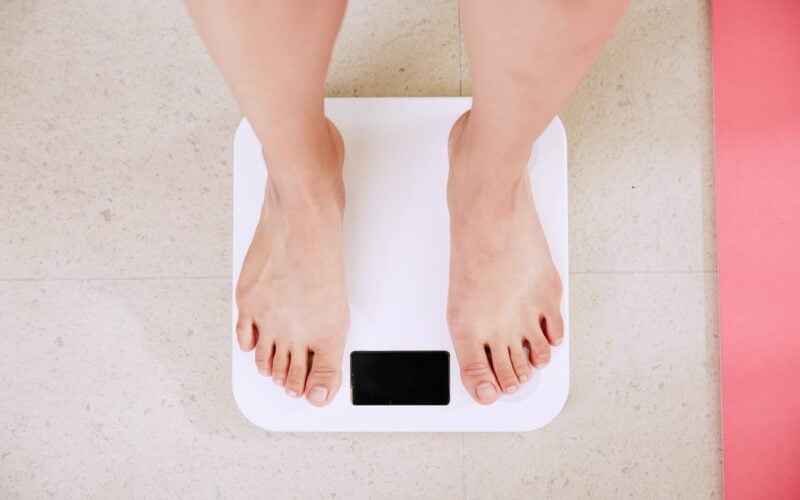Many of us have been there: we’re eating right, we’re exercising, but still the scale won’t budge, and our clothes are still fitting the same. What gives? For some women, their birth control might be to blame for thwarting their fitness goals, possibly causing them to gain weight, changing where their body stores fat, altering their eating patterns, or even keeping them from gaining muscle.
Which kind of birth control can make you gain weight?
Weight gain has long been a contested side effect of birth control, and not all women gain weight when they go on the Pill–so why do some women gain weight on birth control, and is it really the birth control’s fault?
According to new research, women with certain genetics may be more prone to weight gain when using a certain type of birth control–namely, the etonogestrel contraceptive implant, otherwise known as Nexplanon. The study, which followed the weight of women implanted with Nexplanon, found that women with two copies of a certain estrogen receptor 1 variant in their DNA gained an average of 30 more pounds than the women in the study without that ESR1 genetic variant. While the study only included women implanted with Nexplanon, etonogestrel (a synthetic form of progesterone, known as a progestin) can also be found in the vaginal ring (such as the NuvaRing) in combination with the synthetic estrogen ethinylestradiol; the study authors therefore remark that other forms of birth control could conceivably have similar effects on women with a particular genetic makeup.
Birth control and weight gain: Genetics or behavior?
Whether or not birth control actually causes weight gain is a pretty hotly contested subject. Like many birth control side effects, weight gain is often disregarded as “just in her head,” or the fault of the woman herself. Sometimes, when the potential for weight gain on birth control is admitted, it is simply chalked up to temporary “fluid retention” or bloating (which is a commonly reported side effect of birth control).
But what about the women who gain more weight than can simply be attributed to retained fluid?
As seen with the Nexplanon study, your DNA could be at play. It’s also possible that the question “Does birth control cause weight gain?” might be something of a red herring altogether. Because it might not be the birth control itself causing weight gain for some women—it might be the changes in eating patterns that birth control could be causing.
In her book, This is Your Brain on Birth Control, author and evolutionary psychologist Sarah E. Hill describes what birth control may be doing to your eating habits to cause you to eat more, and therefore gain weight.
Hormonal birth control tricks your body into believing it’s perpetually in the luteal phase of your cycle (the time after you ovulate, and prior to when your period begins), so that your body never releases another egg (and no egg = no chance of getting pregnant).
Dr. Hill describes how humans (and other animals) tend to eat less when gearing up for ovulation (when it is possible to get pregnant), and eat more in the aftermath of ovulation (when a woman’s body is preparing itself for the potential months of pregnancy to come). The theory behind this decreased intake during the first half of the cycle, Hill says, is that it “reflects an unconscious motivational trade-off in which women’s increased sexual motivation comes at the expense of decreased motivation to do other things, like eat and digest.” So, if your body constantly thinks it’s in “we need to eat ALL THE THINGS” mode because that’s what the Pill is making it believe, it would make sense to see some weight gain while on the Pill.
The possible birth control-stress-weight gain connection
Yet another theory Dr. Hill posits in her book for why some women may gain weight on birth control is the way it affects how women process stress. We’ve discussed before how birth control causes a woman’s HPA-axis to go into overdrive, sending her cortisol levels through the roof. This results in women’s bodies on hormonal contraception actually mimicking bodies under chronic stress (after the body simply cannot take the elevated stress response anymore, and the HPA-axis basically shuts itself down). Cortisol actually sends fat and sugar out into the bloodstream, so that a healthy body can react as needed in a tense, fight-or-flight situation.
“In the long term, though (as in the context of chronic cortisol signaling), this isn’t great for the body” writes Hill. “Higher-than-normal levels of fat and sugar in the bloodstream can increase the risk of glucose intolerance (pre-diabetes), weight gain (especially abdominal fat), and coronary heart disease.”
How birth control can change your body shape—even if you’re not gaining weight
Maybe your birth control has never made you gain weight, but that doesn’t mean that it can’t affect your shape in other ways. Hill cautions in her book that for the time being, the reasons for possible weight gain on the Pill are just theories—but other research has found that women on the Pill tend to have more of a “pear-shaped” figure, and have more subcutaneous fat than women who aren’t on the Pill (even if it doesn’t necessarily make women on the Pill weigh more).
In another example of the Pill affecting body shape, a 2009 study by an exercise physiologist from Texas A&M University found that women on the Pill gained 40% less lean muscle mass than women who weren’t on the Pill, after the women completed a ten-week exercise regimen designed to build muscle mass. The researchers found that women on the Pill had much less DHEA—a naturally occurring steroid precursor that signals the body to grow muscle, among other functions—circulating in their bloodstream. They deduced that birth control pills containing a certain progestin (synthetic progesterone) may compete with DHEA for the same binding sites, prohibiting the DHEA from doing its job to signal muscle growth.
Weight gain on the Pill might be a complicated discussion, but what’s clear is this: birth control has far more effects on a woman’s body than simply preventing her from getting pregnant. By altering a woman’s hormones, birth control has the potential for downstream effects that many are unaware of until doing their own research. If you’re tired of playing a game of roulette when it comes to the various forms of birth control and their myriad side effects, but you still want effective family planning, it might be time to learn more about fertility awareness methods (FAM) or natural family planning (NFP).
As Cassie Moriarty wrote for Natural Womanhood in “A Case for Organic Birth Control”:
“There are any number of reasons why women switch from hormonal contraception to a fertility awareness method, but the whole ‘not putting synthetic hormones in my body’ bit is often the most popular. By regularly ovulating, women protect their future bone and heart health, often find better intimacy, improve their gut health, lower their risk of depression, and gain important insight into their hormonal health.”
Women shouldn’t have to suffer side effects while planning their families. As women are learning more about evidence-based and effective fertility awareness methods, many are finding freedom from the unwanted weight gain and mental health effects of birth control.
Want some help figuring out which fertility awareness method (FAM) could be right for you? Check out our quiz: Quiz: how to choose your fertility awareness method
When this article refers to fertility awareness methods (FAM), or natural family planning (NFP), we are referring to Fertility Awareness–Based Methods, evidence-based methods of cycle charting which can be used as effective forms of natural birth control when learned by a certified instructor.







